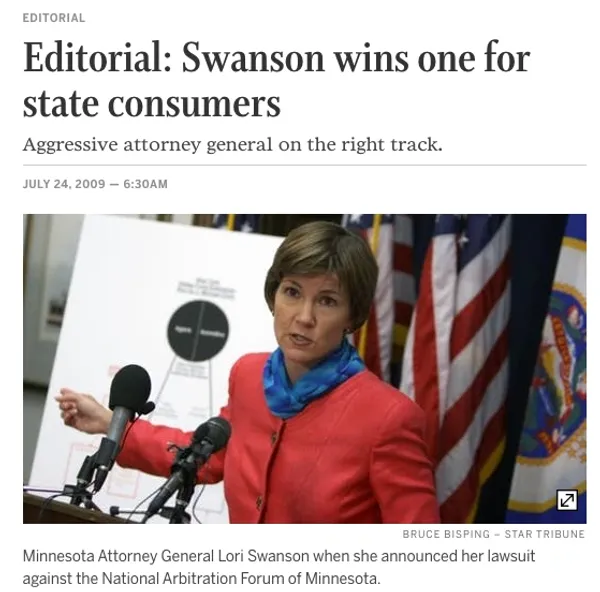at 612-315-3037 or
www.swansonhatch.com

Beginning in 2000-2001, several major credit card banks started using a tactic called “consumer arbitration” as part of the collection process.
The original idea behind arbitration is to provide businesses and individuals with a means of resolving disputes outside the formal legal system. Instead of lawsuits, the parties sit down with a neutral arbitrator and negotiate an out-of-court compromise. In traditional arbitration, the parties jointly agree to arbitrate a dispute after it arises and agree on the arbitrator.
The large credit card banks included “mandatory arbitration” provisions in their credit card contracts with the aim of blocking consumer class-action lawsuits. In other words, the banks avoided class-action lawsuits by inserting a clause that basically says, “Use this card, and you waive your rights to sue us, and are required to use our arbitration process for dispute resolution.”
Setting aside the unfairness of forcing consumers to give up their day in court, the fireworks really began when the banks started using the arbitration process as part of the collection process. The banks would forward delinquent files to a collection law firm, which would then send a demand notice coupled with a threat of filing an arbitration claim. The arbitration company they used was the National Arbitration Forum (NAF).
In 2009, NAF was the country’s largest arbitrator of consumer credit disputes. NAF represented to consumers that it was an independent arbitration company. Arbitration is supposed to be conducted by a neutral third party that has no conflict of interest – that is, no direct involvement with either party to the dispute. NAF was not neutral. Statistics assembled by consumer groups indicated NAF arbitrations favored the banks over 90 percent of the time.
Swanson began an intensive, year-long investigation to determine why the statistics were so lopsided. She discovered the NAF had a roster of arbitrators available for hearings. If an arbitrator ruled for the consumer, the arbitrator was pushed down the list, never to be assigned another case. If the arbitrator ruled for the bank, the arbitrator was rewarded with more arbitration assignments.
Swanson dug further in the investigation and discovered that NAF also had hidden financial ties to Axiant, the largest collection agency in the country, and Mann Bracken, one of the largest collection law firms in the country. The financial ties were through private equity funds controlled by J. Michael Cline of New York. Swanson sued out the matter in a very detailed Complaint that exposed the financial conflicts of interest. NAF then settled the matter with Swanson. In a July, 2009 settlement, NAF signed a consent order with Swanson to cease any further involvement in consumer arbitrations. Within four months, Axiant, the largest collection agency in the country, filed for bankruptcy (in November of 2009). Shortly thereafter, in January of 2010, Mann Bracken (the law firm) also announced that it was filing for receivership.
The National Consumer Law Center gave Swanson the “Champion of Justice” award for her investigation exposing this corruption. She has received numerous accolades from organizations concerning the depth of her investigation.
References:
Swanson v. National Arbitration Forum (2009)
Complaint: https://library.nclc.org/sites/default/files/Arb10_Appx_O-1.pdf
Consent Order: https://library.nclc.org/sites/default/files/Arb10_Appx_O-2.pdf
Congressional Testimony: https://oversight.house.gov/wp-content/uploads/2012/01/20090722Swanson.pdf